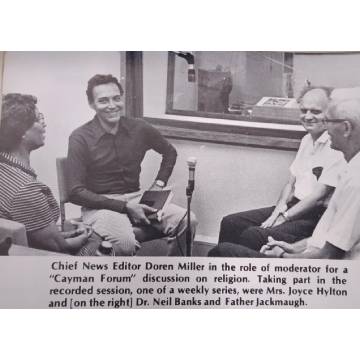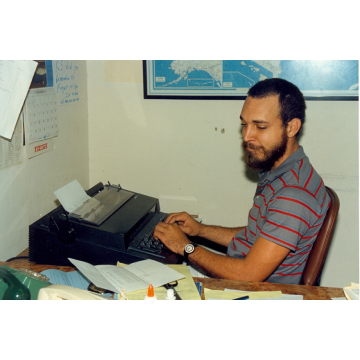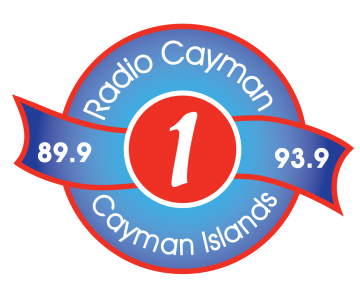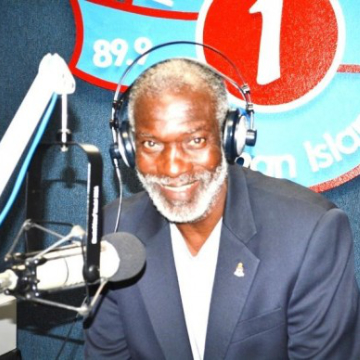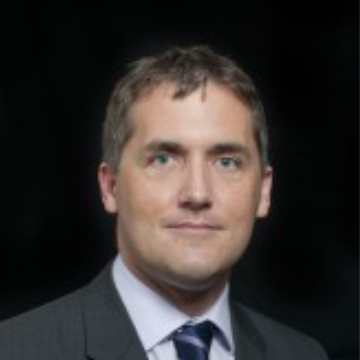News
UCCI Receives Major Grant from EU’s RESEMBID
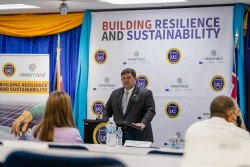
The University College of the Cayman Islands (UCCI)has received a grant of €432,000 ($CI405,000) from the RESEMBID Programme to help train students in trades that are sustainable, both environmentally and economically.
The University made the disclosure at a press conference held Friday March 25, 2022, in the Cascade Room of the UCCI.
Paul Puckerin, Interim Dean of the Professional and Technical Education and Training Division, said 50 unemployed Caymanians will be chosen to participate in the year-long programme. Instruction is expected to begin in May.
RESEMBID, funded by the European Union and implemented by Expertise France - the development cooperation agency of the Government of France, supports sustainable human development efforts in 12 Caribbean Overseas Countries and Territories (OCTs) - Aruba, Anguilla, Bonaire, British Virgin Islands, the Cayman Islands, Curaçao, Montserrat, Saba, Sint Eustatius, Saint Barthélemy, Sint Maarten and Turks and Caicos.
In January 2020, RESEMBID officials met with various local agencies and developed a list of intervention areas. Those included providing support “in the development of academic programmes and supporting [a] pilot solar installation in an effort to increase technical awareness and capacity in the Cayman Islands,” said a report issued by the Cayman Islands Chamber of Commerce. It also suggested developing “sustainable financing strategies for UCCI acquisition of lab equipment.”
Funding for the UCCI project is coming from the RESEMBID COVID-19 Resilience Response Facility, a €12.7 million injection of additional money to address the impact of the COVID-19 pandemic across the 12 OCTs.
RESEMBID Programme Director, Fabian McKinnon said, “One of the areas RESEMBID is most proud to support is the sustainable development and upskilling of the people of this unique, beautiful region. UCCI’s project to empower 50 Caymanians in four critical areas to give them the tools to chart new paths in the next year and beyond speaks to the heart of this programme and we were happy to support”.
Puckerin said associate professor Deborah Beal and senior lecturer Fenslie Smith worked on the initial grant application in early spring 2020 and received approval of the concept note in May 2021. Puckerin worked on a final proposal during the summer and fall under the guidance of Richard Jones of the Caribbean Policy Development Centre in Barbados. Special Assistant to the President and CEO, Dr. Peter Paul and Felicia Robinson, social work programme director, also assisted.
That proposal was submitted November 5 and UCCI got the go-ahead, with some provisions, November 22.
Those accepted into the programme will study in one of four areas:
- renewable energy,
- sustainable construction,
- information and communications technology (ICT), or
- tourism.
Once the application process begins in March 2022, UCCI will partner with Workforce Opportunities & Residency Cayman (WORC) and the Cayman Islands Chamber of Commerce in identifying appropriate candidates. The 50 students who are selected will be notified in April and training will begin by May. Completion of the programme, which includes both classroom education and work internships, is expected in April 2023, followed by a graduation ceremony in May.
Puckerin said UCCI has existing courses in tourism and ICT that will likely provide adequate training for those two prongs of the programme. A current module in photovoltaic technology that is part of the electro-technology certificate curriculum will be expanded to a full course for the renewable energy component, the focus of which will be building a solar-powered water heating system for the campus. Courses will also be added to create a sustainable construction curriculum.
In addition to the cost of training personnel, the grant will pay for tools and equipment. Funds will also be used for a labor market assessment, curriculum development, an after-programme assessment, and the graduation ceremony.
The new programmes, Puckerin said, were selected based on needs expressed by the local business community. He thinks the effort will make an impact.
“I think it’s significant for helping locals to reskill,” Puckerin said, “especially in a time like now, where people have been displaced by COVID. It is hoped that 90% of these people gain employment.”


